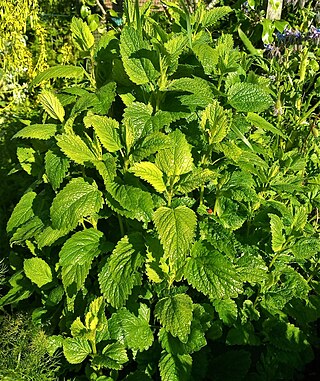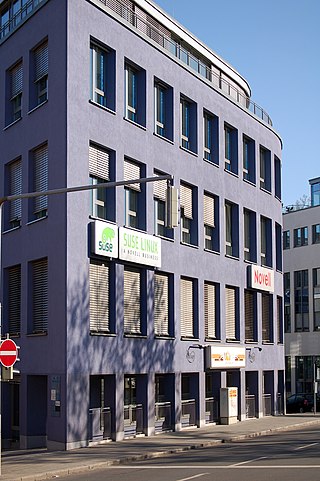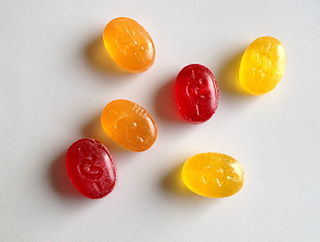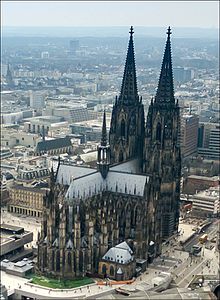
Lemon balm is a perennial herbaceous plant in the mint family and native to south-central Europe, the Mediterranean Basin, Iran, and Central Asia, but now naturalised elsewhere.

Melitta is a German company selling coffee, paper coffee filters, and coffee makers, part of the Melitta Group, which has branches in other countries. The company is headquartered in Minden, North Rhine-Westphalia.
Eau de Cologne or simply cologne is a perfume originating from Cologne, Germany. Originally mixed by Johann Maria Farina in 1709, it has since come to be a generic term for scented formulations in typical concentration of 2–5% and also more depending upon its type of essential oils or a blend of extracts, alcohol, and water. In a base of dilute ethanol (70–90%), eau de cologne contains a mixture of citrus oils, including oils of lemon, orange, tangerine, clementine, bergamot, lime, grapefruit, blood orange, bitter orange, and neroli. It can also contain oils of lavender, rosemary, thyme, oregano, petitgrain, jasmine, olive, oleaster, and tobacco.

Lip balm or lip salve is a wax-like substance applied typically to the lips to moisturize and relieve chapped or dry lips, angular cheilitis, stomatitis, or cold sores. Lip balm often contains beeswax or carnauba wax, camphor, cetyl alcohol, lanolin, paraffin, and petrolatum, among other ingredients. Some varieties contain dyes, flavor, fragrance, phenol, salicylic acid, and sunscreen.

Citrus bergamia, the bergamot orange, is a fragrant citrus fruit the size of an orange, with a yellow or green colour similar to a lime, depending on ripeness.

4711 is a traditional German Eau de Cologne by Mäurer & Wirtz. Because it has been produced in Cologne since at least 1799, it is allowed to use the geographical indication Original Eau de Cologne. The brand has been expanded to various other perfumes and products besides the original Echt Kölnisch Wasser, which has used the same formula for more than 200 years.

SUSE is a German-based multinational open-source software company that develops and sells Linux products to business customers. Founded in 1992, it was the first company to market Linux for enterprise. It is the developer of SUSE Linux Enterprise and the primary sponsor of the community-supported openSUSE Linux distribution project. While the openSUSE "Tumbleweed" variation is an upstream distribution for both the "Leap" variation and SUSE Linux Enterprise distribution, its branded "Leap" variation is part of a direct upgrade path to the enterprise version, which effectively makes openSUSE Leap a non-commercial version of its enterprise product.

Ricola Ltd./RicolaAG is a Swiss manufacturer of cough drops, instant tea, tea bags, and breath mints. The head office of Ricola is located in Laufen, Basel-Country and has subsidiaries in Italy, Great Britain, Asia, and the United States. According to the company, it exports to around 45 countries in Europe, Asia, and North America.

Polar Beverages is a soft drink company based in Worcester, Massachusetts. It is a manufacturer and distributor of sparkling fruit beverages, seltzer, ginger ale, drink mixers, and spring water to customers in the United States. It is the largest independent soft-drink bottler in the United States.
The Design Award of the Federal Republic of Germany is the official design award for Germany presented by the German Ministry for Economics and Technology. The award was given for the first time under the name 'Federal Award for Good Design' in 1969 and thereafter every two years. Moreover, the focus of the award was changed on each occasion. The name of the award was first changed in 1992. Thereafter, the Federal Product Design Award and the Federal Award Promoter of Design — which went to a personality for achievements in the design field — were presented annually. Since 2006, it has been called the Design Award of the Federal Republic of Germany and is given for outstanding achievements in the fields of product and communication design, and to a personality in the design sector. Since 2012, the prize competition has been administered by DMY Berlin GmbH & Co. KG.

Eau de toilette is a lightly scented perfume. It is also referred to as aromatic waters and has a high alcohol content. It is usually applied directly to the skin after bathing or shaving. It is traditionally composed of alcohol and various volatile oils. Traditionally these products were named after a principal ingredient; some being geranium water, lavender water, lilac water, violet water, spirit of myrcia and 'eau de Bretfeld'. Because of this, eau de toilette was sometimes referred to as "toilet water".

Giesecke+Devrient is a German company headquartered in Munich that provides banknote and securities printing, smart cards, and cash handling systems.
Vitol is a Swiss-based Dutch multinational energy and commodity trading company that was founded in Rotterdam in 1966 by Henk Viëtor and Jacques Detiger. Though trading, logistics and distribution are at the core of its business, these are complemented by refining, shipping, terminals, exploration and production, power generation, and retail businesses. Vitol has 40 offices worldwide and its largest operations are in Geneva, Houston, London, and Singapore.

Schaeffler Technologies AG & Co. KG, also known as Schaeffler Group, is a German manufacturer of rolling element bearings for automotive, aerospace and industrial uses. It was founded in 1946 by brothers Dr. Wilhelm and Dr.-Ing. E. h. Georg Schaeffler.
The Verlag Harri Deutsch with headquarters in Frankfurt am Main, Germany, as well as in Zürich and Thun, Switzerland, was a German publishing house founded in 1961 and closed in 2013.

CBSé is an Argentinian brand of yerba mate that has been in the market for more than forty years. It was the first brand to create yerba mate compuesta, which is a mix of yerba mate and herbs. The company produces different types of yerba mate as well as other related products.

The Cologne Cathedral quarter is the area immediately surrounding Cologne Cathedral in Cologne, North Rhine-Westphalia, Germany. When the Gothic cathedral was built, it was closely surrounded by houses and smaller churches. When the cathedral was completed in 1880 as a national symbol, it was freed from adjacent structures and stood isolated, unhampered by traffic. After the inner city was destroyed in World War II, it was rebuilt, with a pedestrian area connecting to the cathedral. In 1970, the Domplatte was constructed as a large concrete surface without steps around the cathedral, which became the location of major open-air events such as Carnival and pop concerts. The design of the cathedral surroundings has remained a challenge for urban planning.
Maria Clementine Martin, birth name Wilhelmine Martin was the inventor of Klosterfrau Melissengeist, an alcoholic extract of herbs.
A. Nattermann & Cie. GmbH is a German pharmaceutical company headquartered in Cologne-Bocklemünd, Nattermannallee 1.













